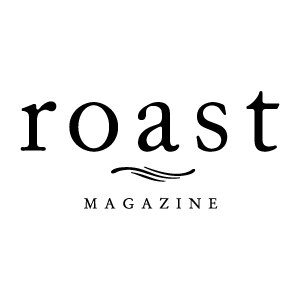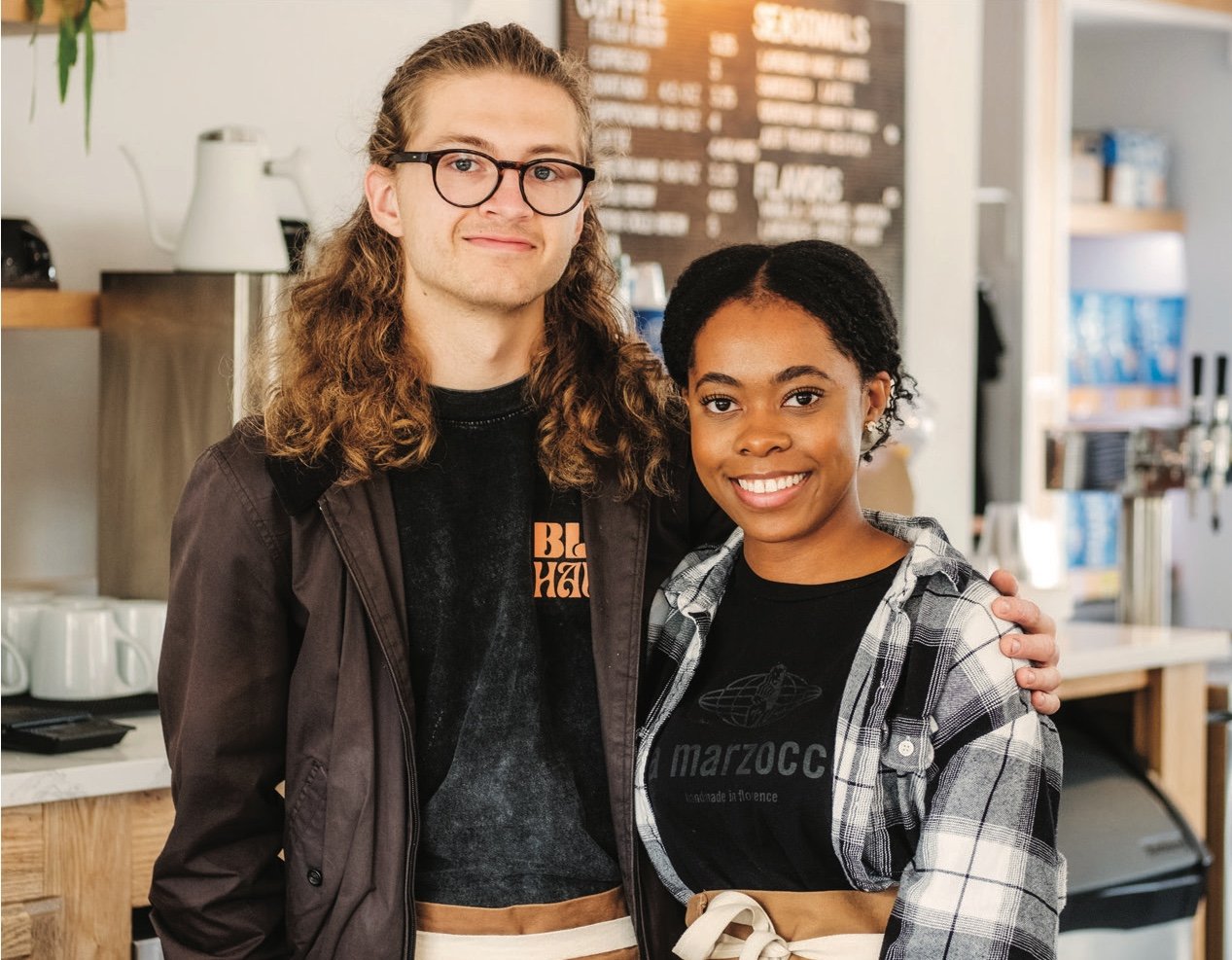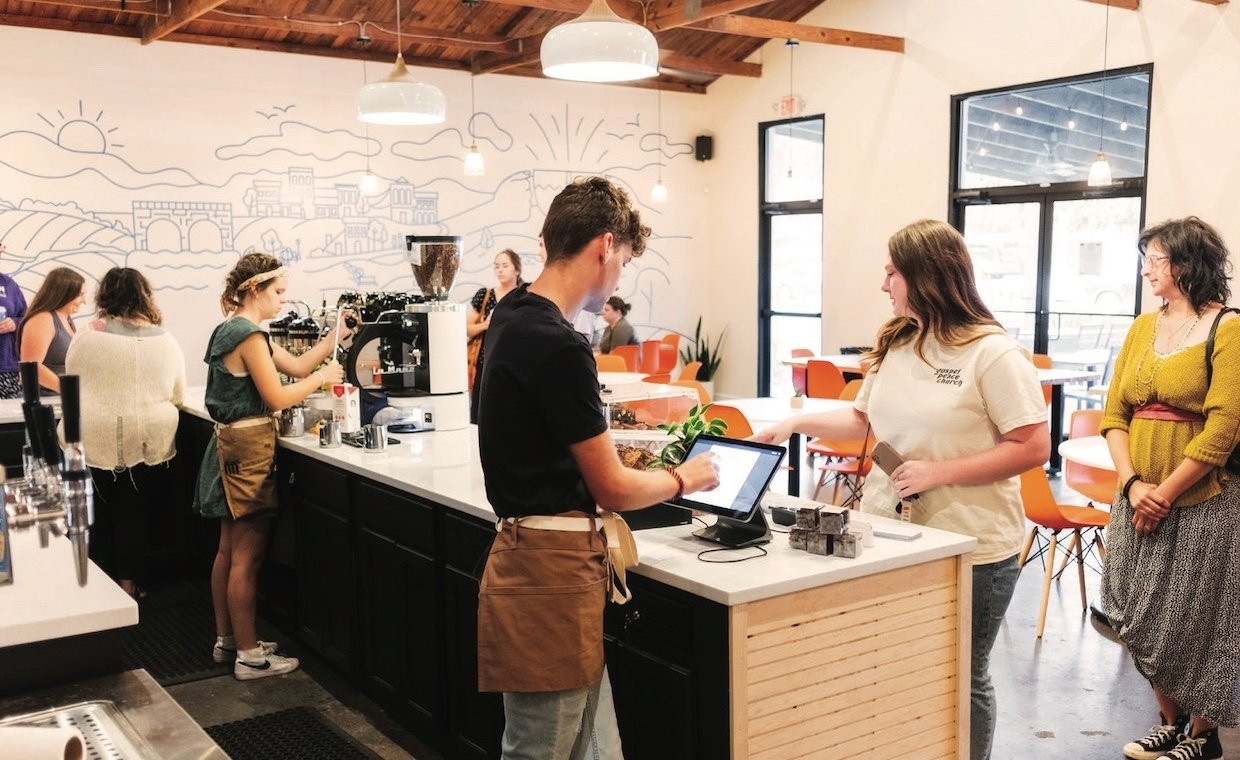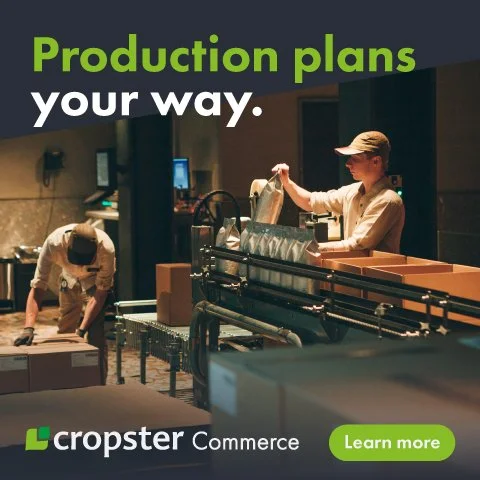Roaster of the Year: Micro Category Winner 2024—Bridge City Coffee
By Emily Puro
Gregory Ward held a lot of jobs before opening Bridge City Coffee—Roast’s 2024 Micro Roaster of the Year—but one common thread connected them all: the genuine desire to make a difference in the world and in the lives of others.
To that end, Bridge City, founded in 2017, has set some lofty goals for a small company in the service industry, including “reclaiming work to empower and equip people through it,” and “removing all commoditization of people from the coffee supply chain,” according to the company’s application for Roaster of the Year. And while “impact is first and foremost,” Ward says, “we refuse to pursue that in a way that comes at the cost of an excellent product.”
After working his way up from bartender to executive director of a church-run community event space, Ward decided to pursue a master’s degree in business leadership. “I was fascinated with leadership,” he says. “Not the admin side of running a business or the numbers, but what makes the best leader. How can a leader draw out the best in the people they’re leading?” One day, as he witnessed a fast-food worker being treated “like garbage” by a co-worker and their manager, he recalls, he told his wife that someday he wanted “to create a place where entry-level employees in the service industry can be treated with dignity, shown value and that they matter.”
Around that same time, while working as a consultant and board member for a nonprofit coffee company in Denver called Purple Door, which hires and trains formerly homeless youth, he began to realize that coffee could be the ideal focus for his dream. “It is a beautiful vehicle for impact,” he says. “What attracted me to it was that we could have a relationship from the start to the finish with everyone involved in the process, and relationship is so crucial to me and what we do.”
When Ward and his wife decided to move to Greenville, South Carolina, her hometown, he started doing “recon trips” to scope out the coffee scene and connect with local nonprofits. He found Greenville primed for specialty coffee, and many of the nonprofits he met with were on board with his vision to build a bridge between organizations supporting youth job development and a real-world for-profit employer.
Bridge City hires at least 25 percent of its staff through nonprofits that work with youth who have experienced barriers to employment, offering stable and supportive jobs where they can gain career skills along with a sense of their own intrinsic value. Most of the nonprofits work with high school students, and while they provide support until the students graduate, Ward says, “once the participants phase out, there’s often no support.” Bridge City’s goal is to equip them for life after high school and/or provide a place for them to continue working after graduation. Whether they’re hired through partner organizations or not, nearly all Bridge City new hires are young people between the ages of 17 and 25 who can use some support launching into successful adulthood.
Supporting Staff is Central to the Mission
Bridge City often hires staff with no professional coffee experience, with the goal of helping them develop skills they can use to grow their careers in or out of the industry. And because most of these new hires have experienced obstacles to success in their lives, the company provides a wide range of support and training that extends well beyond coffee and customer service.
One example is the company’s partnership with AllOne Health, which offers free life coaching, mental health counseling, legal counsel, healthcare advocacy, crisis support, financial planning, debt management and more. Employees can also opt into low-cost non-catastrophic health care, with the company paying half the monthly premium. Bridge City’s accountant and bank have presented financial literacy trainings for staff as well.
Baristas and shift leads Gabriel Clark (left) and Zion Lewis. Photo courtesy of Bridge City Coffee
The trainings are helpful, says Gabriel Clark, a barista and shift lead who has been with Bridge City for more than three years, but the strong relationships staff have forged with company leaders are in many ways even more valuable. “The biggest thing for me personally, and I think for a lot of people,” he says, “is just having those conversations on a day-to-day basis about what the financial world looks like, and then when any of us have any kind of issue, car trouble or some kind of insurance-related thing or just bills or things like that, we can talk to the people because we have that trust. We have that kind of reliance on each other.”
Another tangible way the company supports staff is through its Bridge Fund. When staff apply for assistance through the fund, they meet with a committee to explain their current need, then they receive financial coaching by a professional accountant to help them develop practical skills to deal with life’s unexpected setbacks. Depending on the situation, assistance might involve help with budgeting, a matched savings program or financial resources to help with the immediate need.
Money for the fund comes mainly through the company’s Bridge Card, a $3 gift card that customers can purchase and gift to others. All of the proceeds go directly into the Bridge Fund. Other funding has been provided by partner businesses and individual donors. Ward has looked into making the Bridge Fund a nonprofit so staff wouldn’t have to pay taxes on any money they receive, but that’s proven challenging legally. To offset that, the company pays directly for services, such as car repairs, whenever possible.
At times, just getting support to figure things out is enough. Zion Lewis, a barista and shift lead with Bridge City, has applied to the Bridge Fund twice, once to help with dental expenses and once after a car accident left her without reliable transportation. “For both occasions, because of coaching and working with our financial advisor,” she says, “I was able to save what I needed.”
“This was honestly one of the most successful experiences with the Bridge Fund,” says Ward. “The goal is to empower people, not create dependence, and Zion realized how much she could do on her own.”
And more support is on the horizon. Earlier this year, administrative coordinator Lydia Shedd implemented an entrepreneur operating system—a dynamic strategic planning tool to help the company envision and set goals for the near and long-term future.
The guest experience is a key focus for Bridge City Coffee staff. Photo courtesy of Bridge City Coffee
“We started talking about all the things that seemed unimaginable, and then just anything was on the table,” says Evan Iluzada, director of green coffee and Waco operations. “This is the kind of thing that gives me chills, even right now, when I’m talking about it. These are the dreaming moments of what we can become as an organization.”
One of the most ambitious short-term goals is to secure two multi-tenant housing units within walking or biking distance of the company’s cafes. Employees will apply to live in the units for up to a year, beginning with zero to very low rent, which will increase quarterly until it reaches market rate. In that way, employees without the safety net of savings will be able to save enough to secure their own housing, transportation and other necessities.
It’s no surprise staff turnover at Bridge City is low. According to the company’s Roaster of the Year application, “In over three years, we have retained 80 percent of our staff. Of the 20 percent who have moved on, 30 percent have gone on to promotions in the coffee industry and approximately 40 percent have moved into promotions for their own professional careers.”
Even Clark, who recently earned a bachelor’s degree and has seen his career options expand considerably, says, “It’s going to take a lot for me to leave.”
Staff Development and Training
In addition to providing support for employees’ personal growth, the company has developed comprehensive trainings related to customer service (which it calls “the guest experience”) and specialty coffee.
The guest experience is a huge focus for Bridge City, with every interaction viewed as relational rather than transactional. All employees are trained using the company’s Bridge Guest Experience handbook, which emphasizes authentic communication and a welcoming atmosphere.
Coffee-related training is equally comprehensive, with the company developing its own “Raising the Bar-ista” training program for employees. The program will eventually include three levels—though levels 2 and 3 are still being finalized—each comprising knowledge- and skills-based components. The level 1 course, which all employees are required to complete, starts with basics such as where coffee comes from and different brewing methods, as well as customer service and communication fundamentals. Levels 2 and 3 will be optional for employees who are interested in learning more and advancing their careers in the coffee industry. Employees are recognized for achieving each level with a pay raise and a pin to wear on their apron.
LEFT Evan Iluzada, director of green coffee and Waco operations. Photo courtesy of Bridge City Coffee
MIDDLE At Bridge City Coffee, every interaction is viewed as relational rather than transactional. Photo courtesy of Bridge City Coffee
RIGHT Barista and shift lead Zion Lewis practicing her craft. Photo courtesy of Bridge City Coffee
Raising the Bar-ista is a first step in another big dream that came out of Bridge City’s entrepreneur operating system brainstorming sessions—to open Specialty Coffee Association (SCA) training facilities in Greenville, South Carolina, and Waco, Texas, where the company has a second roastery. “It’s so much aligned with who we are as an organization,” says Iluzada, “because we want to give people more opportunities to grow in the industry and give our employees more opportunities for growth.”
In addition to these formal training programs, staff meetings often include educational components, and every employee meets with a member of the leadership team quarterly to discuss their own aspirations.
Seeking Out Like-Minded Partners
With such a strong core mission, it’s important to Bridge City leadership to partner with organizations, businesses and individuals who share the same values. Quoting one of Bridge City’s importing partners, Iluzada says, “In the absence of values, all decisions are made for profit. That really encompasses the type of organization we want to be because it aligns well with our mission to build value and hope in people through coffee.”
To amplify that mission, Iluzada continues, Bridge City considers a few simple questions when selecting partners throughout the supply chain: “What are your values? What is your mission? What are the pillars of your organization? And can we feel good about partnering with you?”
For now, Bridge City is largely focused on investing in its staff, but it partners with importers who are working to improve livelihoods and sustainability at origin. That’s not to say the company hasn’t made investments at origin. It’s committed to paying above market value for quality coffee, and before opening its first shop and turning its attention to supporting its employees, Bridge City helped fund a community childcare center for an all-female producer group in Rwanda. As the company grows, Ward says, “We are looking forward to getting back into being able to do more directly at origin.”
Building like-minded partnerships is exactly how Bridge City ended up opening a roastery in Waco, Texas. Ward and Iluzada knew each other in college, then reconnected years later when Iluzada was working in athletics at Baylor University in Waco. He’d become fascinated with specialty coffee and started sharing his experiences on Instagram. Ward saw the posts and reached out, and the two eventually decided to team up and open a Bridge City roastery in Waco. And while they agree that Waco is strategically placed for specialty coffee, culturally and geographically, it wasn’t the location that made it an ideal fit.
“The most important aspect in it all was that we were really like-minded,” says Iluzada. “We had the same vision of loving people, caring for people, giving dignity to people, and I was already doing that in my own vocation … [and] engaging in nonprofit organizations here.”
Ward is adamant about continuing that model for expansion. “We will not expand without someone who has established community relationships,” he says, “because that’s so important to us.”
Ward is quick to point out that an operation like Bridge City does not succeed without support from like-minded investors. In fact, he says, he told his investors upfront, “If it comes down to giving you a return or giving my employees raises, I will choose giving my employees raises.” The investors who signed on, he says, “align with that statement and are in full support of that mindset.”
Bridge City @ The Intersection in Greenville, South Carolina. Photo courtesy of Bridge City Coffee
Excellence Without Oppression
Ward created Bridge City as a for-profit business to ensure the model would be sustainable financially, but also to show that success in business doesn’t have to come at the expense of anyone involved in the supply chain.
“We really love having a great product that does care for everyone involved, from the farmer to whoever’s drinking the cup of coffee, so we can be an example that shows you don’t have an excuse to not care for your people along the way,” says Matt Myers, director of Greenville operations. “Excellence never needs to happen at the cost of a person.”
With roasteries in South Carolina and Texas, quality and consistency depend on strong communication and the right tools. Both roasteries use Diedrich IR-12 roasters and share profiles on Cropster. “I talk with Brandon every week,” says Iluzada of his relationship with lead roaster Brandon Nelson, who roasts in South Carolina. “We talk about roast profiles and why did you do this, or can we do this better? And I can physically go into Cropster and look at what he did, where he changed the gas, where he changed the airflow.”
After Nelson and Iluzada develop sample roasts, they invite any employees who are interested to participate in cuppings and provide feedback. “We make cupping simple for everyone because the practice can be intimidating,” says Nelson.
“The cupping table is a place for all of our employees,” agrees Iluzada. “It’s not just for the professionals. It’s not just for people who have been on staff for five years. You don’t have to have Q grader status. You can just have a willingness to participate in coffee. The idea goes back to our core value that we have a growth mentality. We want to position our employees in a place where they’re learning, they feel like their voice can be heard, and they have an opportunity to be at the table.”
That spirit of inclusivity is especially important to Nelson, as “a roaster who is not only Black but also autistic,” he says. “Creativity is more of my language, rather than my words, and I have the privilege of belonging, seeking authenticity, and it’s respected.”
Lead roaster Brandon Nelson. Photo courtesy of Bridge City Coffee
Embracing Healthy Conflict
For a company that focuses so heavily on supporting entry-level employees, it might be surprising that a key element of its culture involves conflict. But conflict is an unavoidable part of life, and one that most Bridge City employees are all too familiar with. What they’re not familiar with, before joining Bridge City, is how to embrace conflict while also building trust and mutual respect.
“I view conflict, healthy conflict, in a way that it’s engaging the inevitable before it catastrophizes,” says Ward. “You have the choice to engage it on your own terms and have it be a win-win, positive, constructive situation rather than destructive. … It’s not who’s right. It’s trying to see through the other person’s eyes and engaging together to come to a common end goal, rather than being at odds against each other.”
When it comes to conflict between staff, the leadership team tries to take a hands-off—though still supportive—approach. When a staff member brings an issue to their supervisor, the supervisor encourages them to talk directly with the other person involved. They’ll often help the employee role play possible ways to approach the conversation. Then they’ll let the employee know they’ll get engaged if that first attempt doesn’t resolve the issue.
“I’ve never been brought in for a second conversation,” says Tori DiMuzio, flagship manager and coffee industry event coordinator. She also encourages staff to be authentic. “Always continue to be your unique self and don’t ever pretend. Don’t ever be fake,” she says. “Don’t ever say something you don’t mean.”
Engaging in healthy conflict plays out between leadership and staff, too. Ward and Clark recall a conflict they had in the early days of covid-19 that turned out to be something of an epiphany for Clark.
“Coming here was the first time I could argue with people and then know, absolutely certainly, that they weren’t going to think less of me or hate me for that disagreement,” he says. “That specific instance was a very notable one, because for me, personally, it was probably the first real conflict I had with somebody that wasn’t a family member, that actually ended up not being conflagrating and destructive. It was a huge thing for me.”
Another key element of Bridge City’s culture is a genuine and not at all ironic focus on love.
“Bridge City was the first place I came to where the idea of love was very, very real and very active,” says Clark. “That oftentimes means going through the hard stuff, dealing with that conflict, having difficult situations and dealing with them, and absolutely doing everything we can to come out the other end, because that is what it means to truly love people, to care about them, to care about their values simply because they’re valuable.”
“My first experience of being loved was here,” agrees Lewis, “and I was not used to that. In my past experiences, hate was the response of conflict and situations toward people or toward things we don’t like. So, coming here to experience love, I had no choice but to respond to that.”
And while some members of the Bridge City team connect that love with spirituality, Ward says he purposefully designed the company to not have a religious connection.
“I have my personal beliefs, and a lot of that is foundational to the organization,” he says, “but I extremely intentionally built it in a way that no one would feel that they had to be a certain way, or if they have differing views that they would feel ostracized.”
For Bridge City’s employees, many of whom have had negative experiences in the past with work, life, and/or interpersonal conflict, the support, patience and genuine caring they find at Bridge City is a life changer. “All the times I wanted to run, all the times I wanted to shut down, all the times I wanted to just be like, you know what, I can’t do this, it was love that pulled me back,” says Lewis. “It just slowly develops. It plants a seed and then the seed begins to grow.”
* * *
Emily Puro is a freelance writer and editor living in Portland, Oregon. In addition to Roast, her articles and essays have appeared in Writer’s Digest, Better Homes and Gardens, Portland Monthly, The Oregonian and numerous other publications. She enjoys learning about the art and science of coffee, as well as the social and environmental impacts of the industry, and she continues to be amazed by those devoting their lives to this work.
Advertisement
















